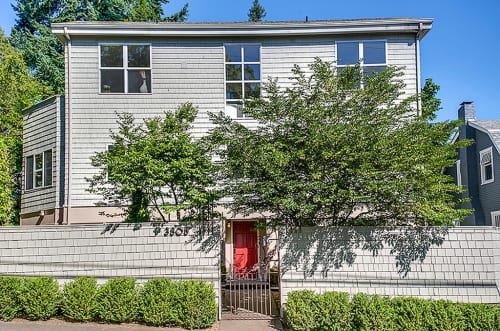Today we will talk about contractors

#יםמהשבוי Amit Shelgi #Post5
Today we will talk about contractors, as we mentioned yesterday there are different laws in different countries regarding what a contractor needs to even issue a GC contractor license, in California for example you have to prove work in the field under a registered contractor for at least 5 years in order to even take the tests, in some countries it is easier that you only need to register as a business and to present an insurance certificate, the countries where it is easier to get a license suffer from more crooks who simply collect money DOWN PAYMENT and disappear or start and do not finish, they will simply open a new company with a different name and move on until they fall on someone who will actually manage to drag them to court.
What I have mentioned here is fraud practice number 1, unfortunately I have encountered clients where the "contractor" disappeared with 20 and 30 thousand dollars in advance, so what do you do to avoid this?
The problem is that relationships with a contractor need to be understood as we are afraid that the contractor will disappear with the money, he is afraid that he will do the work and not get paid, in the end everything comes down to negotiation, and you need to understand his needs so that even if the man is gold, he gave you an offer that includes work + materials , but he doesn't have enough money or credit to buy materials, he will progress slowly because he will buy each time according to the order of payments you set, in the end it will hurt everyone because the project will take longer.
So what is the correct recipe you ask? How do I insure myself financially and the quality of the work?
So first of all it's not easy, and how do you say if it was easy everyone would do it.
I will give you some points:
1. Recommendations - Many times people recommend people from personal acquaintances, so it is that if someone recommends a person to me because he is a relative, friend or acquaintance, it is not interesting. My next question is to him: have you worked with him? What project did he do for you? A recommendation can also be to give a contact person, but in the same breath to say that he is in the profession but I have no work experience with him, and that's fine.
2. Check Google-it - if a contractor comes who claims to have a company and their impression, check it out, in the US there is a concept called DBA Doing business as basically an umbrella company can have several business names under it, and a short Google search will usually give all the information.
3. A contractor and not a salesperson - there are companies that hire salespeople, they don't really know how to build, they will sell you an idea, come with impressive photos but zero knowledge of construction and renovations, or an understanding of what is really required and what is not, these are not the companies you want to work with, by the way All of the renovation costs will be really inflated, it's hard to say and determine who should or shouldn't work with if you're looking for a small company/someone independent or a large company with a back for a long project, for each project/region the answer will be different.
4. Details of the work SCOPE OF WORK - you need to compare apples to apples, to really compare price offers you need to know what you want to do, remember! Basis for changes = opening for the contractor to make a lot of money, if you don't know what is required to carry out a certain renovation, find out beforehand with friends, YOUTUBE, there is no lack of information in today's world, also getting a quote, copying the text, deleting the name and price, and sending it to additional contractors is fine The main thing is that you ask for it SCOPE OF WORK.
An organized work plan is worth time and money!
Sometimes there are several ways to do the same job, don't stress if a certain contractor offers to do something different, it may be that he is simply more professional in a certain way.
5. Filtering - So we met a number of contractors and some salespeople, we received offers, what now?
Of course, in the end you have to work with someone who you feel is attentive, available and has good communication skills, during the project you have to make sure that he is going to be on site and not just sending workers, in this case ask to meet with the person who is going to be on site, see who you can communicate with, many times the workers in the field will talk A foreign language that is not English, and you need to see who is communicating, especially in renovations of old properties, many questions always arise during the project, and most of the times you will find that delays are caused only because the workers in the field do not have answers, or instructions on how to proceed when they encounter something unexpected.
Who do we want? Someone who is in the field who has a phone, can update with videos and photos, who will share straight away when there is a doubt, also an answer from your side of let me check and we will decide together tomorrow is legitimate. But there must be communication.
6. Employment contract!!! - There is no X. There is no project without a written contract, no matter how small the work, there are so many reasons why a written contract is needed, some countries have regulations on what the contract should include, and if there is none then still do it.
What to include in the contract -
· Contractor's name, address and business license number and professional license number.
· Name location in the project + the SCOPE OF WORK
· Timings - an important topic, when do you start, when are you expected to finish, and what happens if you don't finish on time?
Attaching the contractor's insurance certificates.
· Payment arrangement. According to milestones, every week, every month, 4 payments, it doesn't matter, the main thing is to coordinate expectations.
· Signed by both parties.
· * SCOPE changes to insert and update a contract or make another contract.
7. Arrangement of payments:
The payment arrangement mainly depends on who we are working with, is it an established company with credit and a track record, is it someone with an independent business who cannot pay for materials, have we broken down the payments into labor and materials in the contract, or does the contractor provide everything. This data will affect the arrangement of payments, everything is open to negotiation, both with the large company and with the small ones, if you are very involved in the project, and want to insure yourself by paying for materials, even at the SCOP stage we will ask the contractor for a list of quantities of what he estimates It is necessary, so that we can more or less check how many materials he attracts and to make sure that he does not finance other projects with our money. This step requires some level of proficiency, HOME DEPOT, LOWES offer a PRO account where you control material purchases, the cashier calls you for every purchase and you can see in the app exactly what was purchased and pay with a credit card or over the phone.
For those who are not on the site and there is no BOOT ON THE GROUND, it is recommended to close a price including materials, that way the "headache" of having enough materials or making sure that materials do not disappear from the construction site falls on the contractor.
Payment according to the progress of my preferred way, i.e. milestones, breaking down the work into stages and receiving payment according to the stage that is finished, it is important to always remember to leave money at the end of the project, if something is done incorrectly and it only comes up in the last audits of the municipality's inspectors, or of the bank if we Trying to do REFINANCE. Remember - it is always more expensive to change a contractor in the middle or bring in someone else to fix the work, so don't be afraid to insist on leaving a significant part of the payment for the end.
8. Supervision -
You always have to control and control, with this by BOOTS ON THE GROUND, or send a paid inspector every week to verify progress, even if you are with the same contractor for the third project, you don't know what is happening to him right now in his life and whether he has losses in other projects and is Gets into a problematic situation, and will drag you down with him.
9. Don't –
· Start a project without a signed contract and an insurance certificate from the contractor.
· Agree to advances of 30-40% if the rabbi goes to buy materials.
· Do not supervise and rely on pictures and information from the contractor only.
· To be afraid to fire a contractor because he does not perform or because the quality is not good.
· Add work without agreeing a price ("do it, we'll figure it out later")
In conclusion,
There are many components and parts and different levels of finish in a renovation and construction project, the GC or project manager's role is to control the budget, the quality of the work and the pace of the work, not an easy task at all, it is possible to build and renovate the same size of house at different costs, it is important in advance to adjust the budget to the value of the property and the neighborhood in which it is located the property.
So far today, I hope I have helped you a little,
Tomorrow we will talk about BOOTS ON THE GROUND.









































Responses